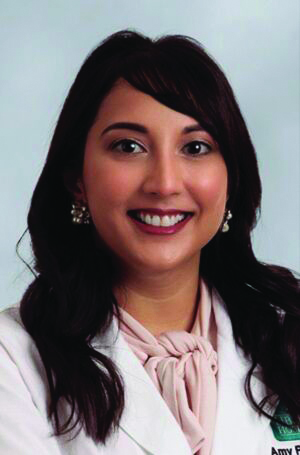By Liberty Hospital
The most effective ways to prevent death from breast cancer are finding and treating it as early as possible. When it comes to mammography screening, annual 3D mammograms are proven best for early detection when treatment options are most effective.
Women at average risk of developing breast cancer should begin annual screening mammograms at age 40. However, now experts recommend that women assess their breast cancer risk by age 25 to determine if they are average/intermediate or high-risk and should begin screening mammograms earlier along with supplemental screening.
Dr. Amy Patel, medical director of the Breast Care Center at Liberty Hospital, is pushing for more extensive research into younger women who have greater risk of developing cancer.
“The incidence of breast cancer among younger women is rising and motivating more extensive research into appropriate screening ages,” said Dr. Patel.
Dr. Patel recommends that all woman, regardless of racial or ethnic background, should undergo a breast cancer risk assessment by age 25. If a woman is deemed to have a lifetime risk of 20% or greater, it is recommended that she begin annual breast MRIs between the ages of 25-29. Then, at age 30, those women should begin alternating between breast MRIs and mammograms every six months.
Though breast cancer in women under 30 is less common, the risk increases with age. The National Cancer Institute reports that women in their 30s have a 1 in 204 (0.4%) chance of developing breast cancer, while women in their 40s have a 1.5% risk. By age 60, the risk rises to 3.5%. This underscores the importance of risk assessments and earlier screenings for women who may be at high risk.
A crucial factor in breast cancer risk is breast density, which can make it harder to detect cancer through traditional mammograms. As of September 2024, all U.S. states are required by the FDA to inform women about their breast density. Women with dense breasts are advised to consider additional screenings like abbreviated breast MRIs or ultrasounds as dense tissue can obscure cancer on a mammogram.
“Breast density is a significant risk factor for breast cancer,” said Dr. Patel. “We recommend supplemental screening if you’re notified that you have dense breasts, though it may not always be covered by insurance. Options like our $325 cash-pay breast MRI can be much more affordable than treating a late-stage cancer.”
For many women, insurance coverage is a deciding factor when it comes to screening. Insurance coverage for mammograms and other breast imaging varies by state and provider. Missouri state law, for instance, requires insurance to cover earlier imaging for women at high risk.
“Many insurance plans cover baseline mammograms between the ages of 35 and 39 and annual screenings at 40,” Dr. Patel said. “However, for supplemental screening like MRIs or ultrasounds, coverage can be limited, especially for women at average and intermediate risk. We believe early detection is a key investment in women’s health, so we have pushed to pass laws in Missouri that require insurance coverage for screenings.”
Experts stress that many breast cancers are not inherited. In fact, 75% of cases occur in women with no family history of the disease, making it critical for all women to get screened according to their risk assessment rather than their family history.
Women under age 40 can receive a free risk assessment at the Breast Care Center at Liberty Hospital. If you need an annual screening mammogram, or if you are at a greater risk for breast cancer, call the Breast Care Center at Liberty Hospital at 792-7089 today to schedule an appointment. Visit libertyhospital.org/breast for more details.




